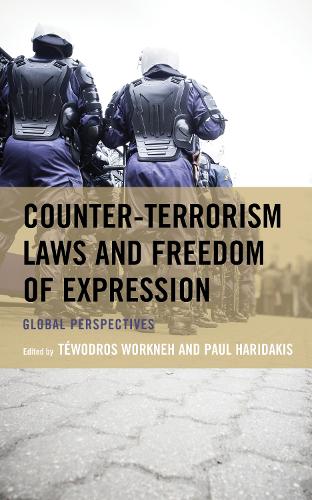
Counter-Terrorism Laws and Freedom of Expression: Global Perspectives
(Hardback)
Publishing Details
Counter-Terrorism Laws and Freedom of Expression: Global Perspectives
By (Author) Twodros Workneh
Edited by Paul Haridakis
Contributions by Rebecca Ananian-Welsh
Contributions by Nazli Bulay Dogan
Contributions by Peter Greste
Contributions by Paul Haridakis
Contributions by Athina Karatzogianni
Contributions by Isabel Serrano Maillo
Contributions by Gabriela Martnez
Contributions by Richard Murray
Bloomsbury Publishing PLC
Lexington Books
22nd June 2021
United States
Classifications
Professional and Scholarly
Non Fiction
Media studies: journalism
News media and journalism
342.0853
Physical Properties
Hardback
408
Width 163mm, Height 228mm, Spine 32mm
826g
Description
As nations have aggressively implemented a wide range of mechanisms to proactively curb potential threats terrorism, Counter-Terrorism Laws and Freedom of Expression: Global Perspectives offers critical insight into how counter-terrorism laws have adversely affected journalism practice, digital citizenship, privacy, online activism, and other forms of expression. While governments assert the need for such laws to protect national security, critics argue counter-terrorism laws are prone to be misappropriated by state actors who use such laws to quash political dissent, target journalists, and restrict other forms of citizen expression.
The book is divided into three parts. Part I deals with the politics and discourse of counter-terrorism laws. Part II focuses on the ways counter-terrorism laws have impacted journalistic practice in different countries, with effects ranging from imprisonment of reporters to self-censorship. Part III addresses how counter-terrorism laws have been used to target everyday citizens, social media activists, whistleblowers, and human rights advocates around the world. Together, the chapters address how counter-terrorism laws have undermined democratic values in both authoritarian and liberal political contexts. Scholars of political science, communication, and legal studies will find this book particularly interesting.
Reviews
"An impressive contribution to the comparative and multi-disciplinary study of counter-terrorism and its effects. This book examines a broad range of jurisdictions from throughout the globe and drills down on how growing counter-terrorism laws too often shrink the space available for free expression."
--Kent Roach, University of Toronto"The global reach of the critiques and analyses in Counter-Terrorism Laws and Freedom of Expression make this book a crucial new tool for the interrogation of dangerous threats to free speech worldwide. Twodros Workneh and Paul Haridakis seamlessly weave representative studies from a diverse array of experts and locales to show that, no matter the system, all governments seek the cover of terrorism to rationalize self-interested censorship. A primary - and sobering - text across disciplines, from political science to international studies to journalism and beyond."
--Peter Laufer, University of Oregon"The main contribution of this book is the reflection on the ways democratic and non-democratic states deals with the threat of external and internal terrorism using counter-terrorism as their legal machinery. The book sheds light on a wide spectrum of the risks counter-terrorism poses to democratic values such as freedom of expression by showing the difficulties to maintain this right in times of combating terrorism. The book indicates strongly what happens when states are using anti-terrorism acts without strong judicial review by the courts. Without due balances between the needs of security and preservation of freedom of expression we are depriving our citizens from having a fair report about security operations and the risks involved in the lives of media personnel."
--Emanuel Gross, University of HaifaAuthor Bio
Twodros Workneh is assistant professor of global communication at the School of Communication Studies, Kent State University.
Paul Haridakis is professor of communication studies at Kent State University.
